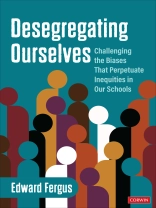Challenge the biases and beliefs at the root of disproportionality
Although the Supreme Court’s landmark decision in Brown v. Board of Education recognized the detrimental effects of racist ideology in American education, disproportionality and inequality persist in our schools. Desegregating Ourselves offers educators a framework for examining and disrupting the deficit-based biases and belief systems that undergird our education system and continue to harm minoritized students. This groundbreaking book examines the root causes of persistent disproportionality, including systemic inequality, color blindness, deficit thinking, and poverty disciplining–all of which create barriers to success for marginalized students. Features include:
- An in-depth survey of race and racism in the American education system, its laws, and its policies, all of which perpetuate systemic inequality and harmful stereotypes
- A practical framework for developing cross-cultural skills and dispositions that challenge our biases and promote educational equity
- Concrete strategies for interrupting and replacing deficit-based thinking and prejudices
- Powerful reflections based on survey data from over 4, 000 educators, which vividly illustrate how our beliefs manifest in schools and in our treatment of students
Desegregating Ourselves is a critical guide for educators brave enough to address disproportionality by confronting the biases and belief systems that impact marginalized students. By learning to cultivate cross-cultural skills and dispositions, educators can realize the vision of educational equity for all students.
Cuprins
Dedication
Acknowledgements
Introduction
About the Author
Chapter 1: History and Background of Whiteness Used to Create Ethno-Racial Segregation
Chapter 2: The Fear of Losing the Standard: From 20th Century Desegregation to 21st Century Anti-Integration Movement
Chapter 3: Colorblindness Belief: Ignoring Race as a Strategy for Maintaining Social Desirability
Chapter 4: Deficit Thinking and Poverty Disciplining: Our Societal Fixation on Poverty
Chapter 5: Interrupting Bias-based Beliefs Built on Whiteness
Appendix 1: Reflecting on our Whiteness Exposure
Appendix 2: Shopping Cart List of Experiences: Everyday Colorblindness and Evasiveness
Appendix 3: Colorblindness Reflection Activity
Appendix 4: Shopping Cart List of Experiences: Everyday Deficit Thinking and Poverty Disciplining
Appendix 5: Deficit Thinking and Poverty Disciplining Reflection Activity
Appendix 6: Exploring our Current Cross-Cultural Lives, Skills, and Competencies
Appendix 7: Additional Cross-Cultural Activities
Appendix 8: Professional Development Template for Equity Belief Work (Leadership Tool)
Despre autor
Dr. Edward (Eddie) Fergus is Professor of Urban Education in the School of Arts and Sciences at Rutgers University – Newark. Prior to joining Rutgers University – Newark, Dr. Fergus was Associate Professor of Urban Education and Policy at Temple University (2017-2022) and Assistant Professor of Educational Leadership and Policy at New York University (2013-2017), and Deputy Director of the Metropolitan Center for Urban Education at New York University (2004-2013). As a former high school social studies teacher, program evaluator, and community school program director, Dr. Fergus is continuously approaching research with an attention to its application within educational settings. Dr. Fergus’ work is on the intersection of educational policy and outcomes with a specific focus on Black and Latino boys’ academic and social engagement outcomes, disproportionality in special education and suspensions, and school climate conditions. He has published more than four dozen articles, book chapters, evaluation reports, and five books including Skin Color and Identity Formation: Perceptions of Opportunity and Academic Orientation among Mexican and Puerto Rican Youth (Routledge Press, 2004), co-editor of Invisible No More: Disenfranchisement of Latino Men and Boys (Routledge Press, 2011), co-author of Schooling For Resilience: Improving Trajectory of Black and Latino Boys (Harvard Education Press, 2014), author of Solving Disproportionality and Achieving Equity (Corwin Press, 2016), co-editor of forthcoming book Boyhood and Masculinity Construction in the US (Routledge Press, forthcoming). Fergus has worked with over 120 school districts since 2004 on educational equity and school reform, specifically addressing disproportionality in special education and suspension. Fergus partners with state education departments and serves on various boards such as NY State Governor’s Juvenile Justice Advisory Group (2010-present), appointed in 2011 to the Yonkers Public Schools Board of Education (2011-2013 and 2019-2021), National Center on Learning Disabilities (2020-present), and is an expert consultant for the U.S. Department of Justice Civil Rights Division on Educational Opportunities (2014-2016), New York State Attorney General’s Office (2022), and NAACP Legal Defense Fund (2018). Dr. Fergus received a bachelor’s degree in Political Science and Secondary Education – Broad Field Social Studies from Beloit College and a doctorate in Educational Policy and Social Foundations from the University of Michigan.












